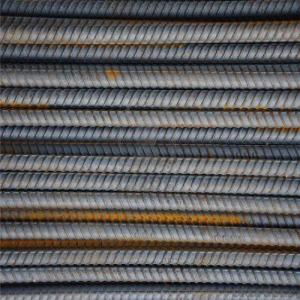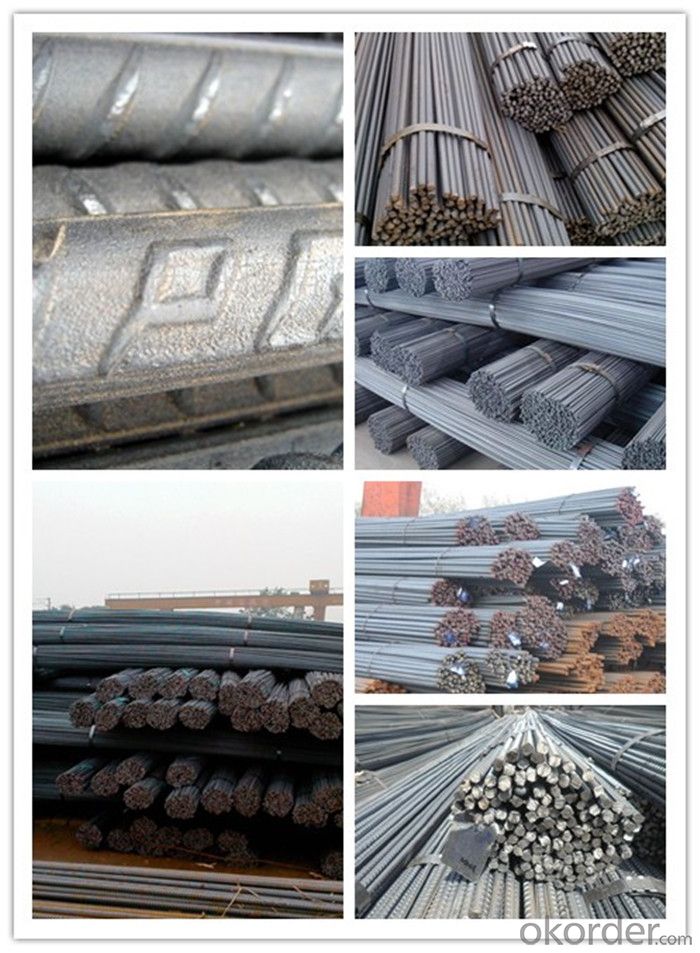Concrete Reinforced Steel Bar Used in Building
- Loading Port:
- Tianjin
- Payment Terms:
- TT OR LC
- Min Order Qty:
- 100 m.t.
- Supply Capability:
- 50000 m.t./month
OKorder Service Pledge
OKorder Financial Service
You Might Also Like
Item specifice
Concrete Reinforced Steel Bar Used in Building
Description of Concrete Reinforced Steel Bar:
1, Diameter: 5.5mm-10mm rounds reinforcing steel bar
10m- 40mm Concrete Reinforced Steel Bar
2, Length: 6m, 9m, 12m or customized
3, Standard: GB, ASTM, AISI, SAE, DIN, JIS, EN
OEM technology - send detailed technical parameters for accurate quotation.
2, Produce Process: smelt iron - EAF smelt billet - ESR smelt billet -
hot rolled or forged to get the steel round bar and plate
3, Heat Treatment: annealing, normalizing, tempering, quenching
4, Surface Treatment: Black
5, Quality Assurance: We accept third party inspection for all orders.
You can ask testing organizations such as SGS, BV, etc. to test our products before shipping.
Chemical Composition of Concrete Reinforced Steel Bar:
Grade | Technical data of the original chemical composition(%) | |||||
Reinforcing steel bar HRB335 | C | Mn | Si | S | P | B |
≤0.25 | ≤1.60 | ≤0.80 | ≤0.045 | ≤0.045 | >0.0008 | |
Physics Capability | ||||||
Yield Strength(N/cm2) | Tensile Strength(N/cm2) | Elongation(%) | ||||
≥ 335 | ≥490 | ≥16 | ||||
Reinforcing steel bar HRB400 | C | Mn | Si | S | P | B |
≤0.25 | ≤0.16 | ≤0.80 | ≤0.045 | ≤0.045 | 0.04-0.12 | |
Physics Capability | ||||||
Yield Strength(N/cm2) | Tensile Strength(N/cm2) | Elongation(%) | ||||
≥ 400 | ≥ 570 | ≥ 14 | ||||
Product Show of Concrete Reinforced Steel Bar:
Company Information:
CNBM International Corporation is the most important trading platform of CNBM group.
Whith its advantages, CNBM International are mainly concentrate on Cement, Glass, Iron and Steel, Ceramics industries and devotes herself for supplying high qulity series of refractories as well as technical consultancies and logistics solutions.


FAQ:
1, Your advantages?
professional products inquiry, products knowledge train (for agents), smooth goods delivery, excellent customer solution proposale
2, Test & Certificate?
SGS test is available, customer inspection before shipping is welcome, third party inspection is no problem
3, Factory or Trading Company?
CNBM is a trading company but we have so many protocol factories and CNBM works as a trading department of these factories. Also CNBM is the holding company of many factories.
4, Payment Terms?
30% TT as deposit and 70% before delivery.
Irrevocable L/C at sight.
5, Trading Terms?
EXW, FOB, CIF, FFR, CNF
6, After-sale Service?
CNBM provides the services and support you need for every step of our cooperation. We're the business partner you can trust.
For any problem, please kindly contact us at any your convenient time.
We'll reply you in our first priority within 24 hours.
- Q:What are the properties of high-strength alloy steel?
- High-strength alloy steel possesses several key properties that make it desirable for various applications. It has excellent tensile strength, allowing it to withstand heavy loads and resist deformation. The steel also exhibits high toughness, making it resistant to fracture even under extreme conditions. Furthermore, it offers exceptional corrosion resistance, ensuring longevity and durability in harsh environments. Additionally, high-strength alloy steel often maintains its properties at elevated temperatures, making it suitable for high-pressure and high-temperature applications.
- Q:How is mold steel used in the production of plastic injection molds?
- Mold steel is commonly used in the production of plastic injection molds due to its high durability and resistance to wear and tear. It is used to create the main components of the mold, such as the cavity and core, which are responsible for shaping the plastic material. Mold steel provides the necessary hardness and strength to withstand the high pressures and temperatures involved in the injection molding process. Additionally, its excellent machinability allows for precise and intricate mold designs, ensuring the production of high-quality plastic parts.
- Q:What is the role of boron in special steel alloys?
- Special steel alloys rely heavily on the presence of boron as it plays a crucial role in enhancing their mechanical properties and overall performance. One of the key functions of boron is to act as a hardenability agent, thereby improving the steel's hardness and strength. This is achieved by forming boride particles that act as strengthening agents within the microstructure. Moreover, boron aids in refining the grain structure of steel, resulting in improved toughness and crack resistance. It promotes the formation of fine-grained microstructures, which consequently enhance the steel's ability to withstand high temperatures, pressure, and wear. Additionally, boron assists in the solidification process of steel, reducing the risk of hot cracking during casting or welding. It accomplishes this by lowering the steel's melting point, allowing for better fluidity and improved flowability during manufacturing processes. Furthermore, the inclusion of boron in steel alloys also enhances their machinability, making them easier to work with and reducing tool wear. In conclusion, the addition of boron to special steel alloys significantly contributes to their strength, hardness, toughness, and resistance to various forms of degradation. Its role is crucial in optimizing the performance and durability of these alloys in demanding applications such as automotive components, aerospace structures, and industrial machinery.
- Q:How is special steel stored and transported?
- Special steel is stored and transported with utmost care to ensure its quality and integrity are maintained. Firstly, during storage, special steel is kept in a controlled environment with appropriate temperature and humidity levels to prevent any corrosion or damage. It is often stored in covered warehouses or storage facilities specifically designed for steel, offering protection from environmental factors such as rain, snow, and sunlight. When it comes to transportation, special steel is transported using various methods depending on the quantity and distance. For short distances, smaller quantities can be transported by trucks equipped with flatbeds or enclosed trailers. These trucks are designed to securely hold and protect the steel during transit, preventing any shifting or damage. However, for longer distances or larger quantities, special steel is often transported via rail or sea. Rail transportation ensures a smooth and stable journey, reducing the risk of damage due to vibrations or sudden movements. Steel is loaded onto specially designed railcars that provide secure storage and protection during transit. Sea transportation involves loading the steel onto shipping containers or directly onto specialized vessels. Containers are sealed and secured to prevent any movement or damage during the journey. Specialized vessels, such as roll-on/roll-off ships or heavy-lift vessels, are used for transporting oversized or extremely heavy steel components. In all cases, special steel is carefully packaged and secured using appropriate materials, such as wooden crates, steel strapping, or plastic wrapping, to prevent any scratches or dents. Additionally, the transportation process is closely monitored, and any necessary precautions are taken to ensure the steel arrives at its destination in optimal condition. Overall, the storage and transportation of special steel require meticulous planning, proper handling, and the use of specialized equipment to safeguard its quality and protect it from any potential damage or degradation.
- Q:How are magnesium alloys used in lightweight structures?
- Magnesium alloys are used in lightweight structures due to their exceptional strength-to-weight ratio. They offer high tensile strength and stiffness, making them suitable for applications where weight reduction is crucial, such as in the aerospace and automotive industries. These alloys are commonly used in components like aircraft fuselages, engine casings, and lightweight vehicle parts, contributing to improved fuel efficiency and performance. Additionally, magnesium alloys can be easily cast, machined, and welded, allowing for efficient manufacturing processes.
- Q:What are the different classifications of special steel?
- Special steel is a broad term that encompasses various types of steel alloys that possess unique properties and characteristics, making them suitable for specific applications. There are several classifications of special steel, including: 1. Stainless Steel: This type of special steel contains a high percentage of chromium, which provides excellent corrosion resistance. It also typically contains other elements like nickel and molybdenum, enhancing its strength and durability. Stainless steel is commonly used in applications that require resistance to oxidation, heat, chemicals, and wear, such as in food processing, medical devices, and construction. 2. Tool Steel: Tool steel is specifically designed for manufacturing tools, dies, and molds. It is known for its exceptional hardness, wear resistance, and toughness. Tool steel is further classified into several subcategories, including high-speed steel (HSS), cold work steel, hot work steel, and plastic mold steel, each tailored for specific tooling applications. 3. Alloy Steel: Alloy steel is a type of special steel that contains additional alloying elements apart from carbon. These elements, such as manganese, silicon, nickel, chromium, and molybdenum, are added to enhance specific properties like strength, toughness, hardenability, and corrosion resistance. Alloy steels are used in various applications, such as automotive components, machinery, construction, and aerospace. 4. Spring Steel: This type of special steel is specifically designed to withstand repeated bending or twisting without permanently deforming. Spring steel has excellent elasticity and fatigue resistance, making it suitable for applications such as springs, suspension systems, and high-performance automotive parts. 5. Bearing Steel: Bearing steel is engineered to provide high hardness, wear resistance, and dimensional stability necessary for manufacturing bearings. It typically contains high levels of carbon, chromium, and other alloying elements, ensuring the required mechanical properties for reliable and long-lasting bearings. 6. Electrical Steel: Electrical steel, also known as silicon steel, is specifically designed for electrical applications. It possesses low electrical resistivity and high magnetic permeability, allowing it to efficiently conduct and transform electrical energy. Electrical steel is commonly used in transformers, electric motors, and generators. These classifications of special steel highlight the versatility and tailored properties of different steel alloys, enabling their application in a wide range of industries and specialized uses.
- Q:What are the main characteristics of tool steel?
- Tool steel, a specialized type of steel, is specifically engineered for the manufacturing of tools such as drills, dies, and cutting instruments. It boasts several key attributes that render it suitable for these applications. Primarily, tool steel is renowned for its exceptional hardness. It contains a substantial amount of carbon, typically ranging from 0.5% to 1.5%, which contributes to its hardness. This hardness enables tool steel to withstand wear and abrasion, making it perfect for cutting and shaping materials. Another crucial characteristic of tool steel is its remarkable toughness. It possesses the ability to endure high impact and shock loads without fracturing or breaking. This toughness is vital in tooling applications where tools are subjected to heavy loads and forces. Tool steel also exhibits superb heat resistance. It possesses a high melting point, allowing it to retain its strength and hardness even at elevated temperatures. This heat resistance is essential in applications where tools are exposed to high temperatures during cutting or shaping processes. Furthermore, tool steel possesses excellent dimensional stability and machinability. It experiences minimal distortion and shrinkage during heat treatment, ensuring that the tool retains its shape and size. Additionally, tool steel is easily machined, enabling the production of intricate shapes and designs. Overall, the prominent characteristics of tool steel encompass high hardness, toughness, heat resistance, dimensional stability, and machinability. These properties establish tool steel as an ideal material for the production of tools that necessitate high strength, durability, and performance.
- Q:What are the environmental impacts of producing special steel?
- The production of special steel can have several environmental impacts. Firstly, the extraction of raw materials, such as iron ore and coal, can lead to habitat destruction and soil erosion. Additionally, the energy-intensive processes involved in steel production, such as smelting and refining, contribute to greenhouse gas emissions, air pollution, and climate change. Moreover, the disposal of waste materials, including slag and dust, can contaminate water sources and harm aquatic life. It is crucial to implement sustainable practices and technologies to mitigate these environmental impacts and ensure responsible steel production.
- Q:How does special steel perform in terms of weldability?
- Special steel generally has good weldability due to its composition and specific manufacturing processes. It can be easily joined or welded to other metals through various welding techniques. The high carbon content and alloying elements in special steel provide good heat resistance and prevent cracking during welding. Additionally, special steel often undergoes specific heat treatments to optimize its weldability, making it a preferred choice in industries that require strong and reliable welded structures.
- Q:How is heat-resistant steel used in high-temperature applications?
- Heat-resistant steel is used in high-temperature applications due to its ability to withstand extreme heat without losing its structural integrity. It is commonly used in industries such as aerospace, automotive, power generation, and petrochemical, where components are exposed to high temperatures. This steel is used to manufacture parts like turbine blades, exhaust systems, heat exchangers, and furnaces, ensuring reliable performance and preventing premature failure at elevated temperatures.
1. Manufacturer Overview |
|
|---|---|
| Location | |
| Year Established | |
| Annual Output Value | |
| Main Markets | |
| Company Certifications | |
2. Manufacturer Certificates |
|
|---|---|
| a) Certification Name | |
| Range | |
| Reference | |
| Validity Period | |
3. Manufacturer Capability |
|
|---|---|
| a)Trade Capacity | |
| Nearest Port | |
| Export Percentage | |
| No.of Employees in Trade Department | |
| Language Spoken: | |
| b)Factory Information | |
| Factory Size: | |
| No. of Production Lines | |
| Contract Manufacturing | |
| Product Price Range | |
Send your message to us
Concrete Reinforced Steel Bar Used in Building
- Loading Port:
- Tianjin
- Payment Terms:
- TT OR LC
- Min Order Qty:
- 100 m.t.
- Supply Capability:
- 50000 m.t./month
OKorder Service Pledge
OKorder Financial Service
Similar products
New products
Hot products
Related keywords

































